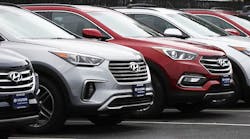South Korea’s biggest automaking group, which faced a consumer backlash in China last year over tensions between the two countries, forecast a slowdown in sales in 2018 as political risks dent demand for its vehicles in the world’s major markets.
Hyundai Motor Co. and affiliate Kia Motors Corp. said Tuesday their combined sales in 2017 dropped 7% to 7.25 million units, the least in five years and a million short of its record target. Citing stalling global economic growth, rising protectionism and dangers posed by geopolitics as threats, the companies set a goal to sell 7.55 million vehicles this year.
With Ford Motor Co. on its heels, Hyundai Motor group is fighting to maintain its rank as the world’s fifth-biggest automaker after underperforming rivals in the U.S., where a booming demand for sport utility vehicles exposed the Korean maker’s dearth of models. Hyundai is also preparing to catch up with makers such as Volkswagen AG and Nissan Motor Co. in the field of technology as the industry spends billions on autonomous and electric vehicles.
Shares of Hyundai Motor fell 4.2%, the most in about three weeks, while those of Kia fell 2.1% in Seoul Tuesday, after they failed to meet their targets for the third consecutive year.
“I don’t expect them now to go back to the time they sold about 8 million cars,” said Kim Joon-sung, an analyst at Meritz Securities Co., adding the automakers are still recovering from the blow they received in China last year.
The automaker was hit by a boycott in China last year, which halved sales in its biggest market, after South Korea decided to deploy a U.S. missile defense system on its soil, which China considered a threat.
To help reclaim some of the markets, Hyundai is planning to expand its SUV lineup in China from four to seven by 2020, while in the U.S., it proposes to introduce new SUVs such as the small Kona and a new Santa Fe early this year.
The two automakers are also bolstering investments in new areas such as autonomous driving technology, artificial intelligence and environmentally friendly vehicles. Hyundai set up new research institutes last year, including one in Silicon Valley to catch up on these new technologies. They are also planning to bring to market as many as 38 green cars by 2025, including an electrified Kona SUV with a range of 400 kilometers (249 miles) and a Genesis luxury electric vehicle with a range of 500 kilometers.
By Sohee Kim



